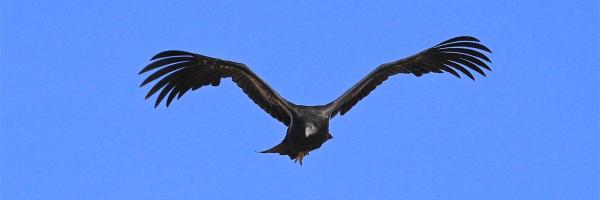Tim Hauck
SPRINGDALE, UT – Zion National Park biologists confirmed a California Condor chick in a nest on the cliffs just north of Angels Landing. Biologists estimate the egg was laid mid-March and hatched beginning of May. Zion National Park is a member of The Southwest Condor Working Group that includes state wildlife agencies of Utah and Arizona, federal partners including U.S. Fish and Wildlife Service, Bureau of Land Management, and National Forest Service, and private partners including The Peregrine Fund who manages releases and day to day monitoring for the population.
The female, condor 409 (tag 9) hatched in 2006 at the San Diego Zoo and was released at the Vermillion Cliffs National Monument release site in 2008. The male, condor 523 (tag J3) hatched in 2009 at The Peregrine Fund’s World Center for Birds of Prey in Boise, ID and was released at the Vermilion Cliffs release site in Arizona in 2011. They have been together for two years since 409’s first mate (condor 337) died from lead poisoning in 2016. This would be condor 409’s third confirmed chick. We are keeping a close watch, hoping that this chick will be her first chick to fledge successfully, this November.
In 1982, only 22 California condors were left in the world. Due to the steep decline of the population, the remaining wild condors were captured and held in captivity for safekeeping which gave rise to a tremendously successful captive breeding program that has allowed for reintroduction of the endangered birds back to the wild beginning first in 1992 in California and following in 1996 in Arizona. The population now numbers more than 500 with over half of those flying free in the wild. Each bird, whether produced in the wild, or in captivity, is given a studbook number to differentiate it from others, and this most recent chick received studbook number 1000. A milestone that captures the essence of the population’s progress towards recovery.
This 1000th chick is the product of the united efforts of citizens, biologists, government and non-government agencies to keep these magnificent birds flying free.
"We are so excited to hear about this monumental milestone in the condor recovery program," Russ Norvell, Utah Division of Wildlife Resources avian conservation program coordinator, said. "We also applaud Zion National Park for their great stewardship of these particular birds. We look forward to continued success with all our partners in helping this endangered species."
“After over two decades of efforts to restore condors to the southwest, it is nice to take a moment to reflect on the steady and slow progress made and thank those who have contributed so much, like Zion National Park, to see this effort through. We have a long way to go, but today we celebrate this milestone.” Chris Parish, Director of Conservation for The Peregrine Fund.
40,000 years ago, condors scavenged on mammoths and giant sloths, and would have been found throughout much of North America. California condors are now limited to a small range in Arizona, Utah, northern Mexico, and California. Condors nest in caves or large crevices. A female will typically lay her egg on the floor of the cave. Both parents share incubation duties lasting approximately 57 days. The chick can take up to three days to hatch. Nestling condors are fed regurgitated meat by both of their parents. Although the chick will leave the nest and take its first flight at around six months of age, it still relies on its parents for food for as long as a year. By that time parents will have missed the next breeding season, allowing only one offspring every two years at best.
Lead poisoning is the primary cause of condor mortality and a remaining obstacle to the recovery of the population. Hunters and others are helping to reduce the amount of lead in the environment, improving chances for condor survival.






